
Legal translation plays a pivotal role in ensuring that documents are accurately and reliably translated, preserving the integrity of legal transactions. In Dubai's diverse, fast-paced business environment, the need for precise translation is more significant than ever.
Whether dealing with business contracts, immigration documents, court proceedings, and other documents, choosing an accredited legal translation company in Dubai like Prime Quality Translation is essential for protecting your legal rights and ensuring compliance.
This article outlines why accreditation matters in translation and how it benefits businesses and individuals.
The Importance of Accreditation in Legal Translation
Accreditation formally recognizes that a translation company meets specific standards set by international authorities and legal bodies. When it comes to legal documents, precision and clarity are non-negotiable. An accredited translation company ensures that your documents are handled by qualified professionals who understand the legal terminology and cultural nuances.
This certification typically means that the company has passed rigorous evaluations and its translators are qualified to handle specialized legal language. It also indicates the company's commitment to upholding quality and reliability.
Why Choose Accredited Legal Translation Company in Dubai?
Dubai's dynamic landscape attracts global businesses and expatriates, creating a demand for accurate translations of contracts, certificates, and other legal documents. Opting for an accredited legal translation company in Dubai provides numerous advantages, such as:
- Quality Assurance: Accredited company follows rigorous quality control processes, ensuring error-free translations.
- Legal Compliance: They are recognized by UAE courts and authorities, making their translations legally valid.
- Timely Delivery: Accreditation often signifies professionalism and punctuality.
- Confidentiality: Accredited company prioritizes data protection, safeguarding sensitive client information.
Prime Quality Translation for Precise Document Translations
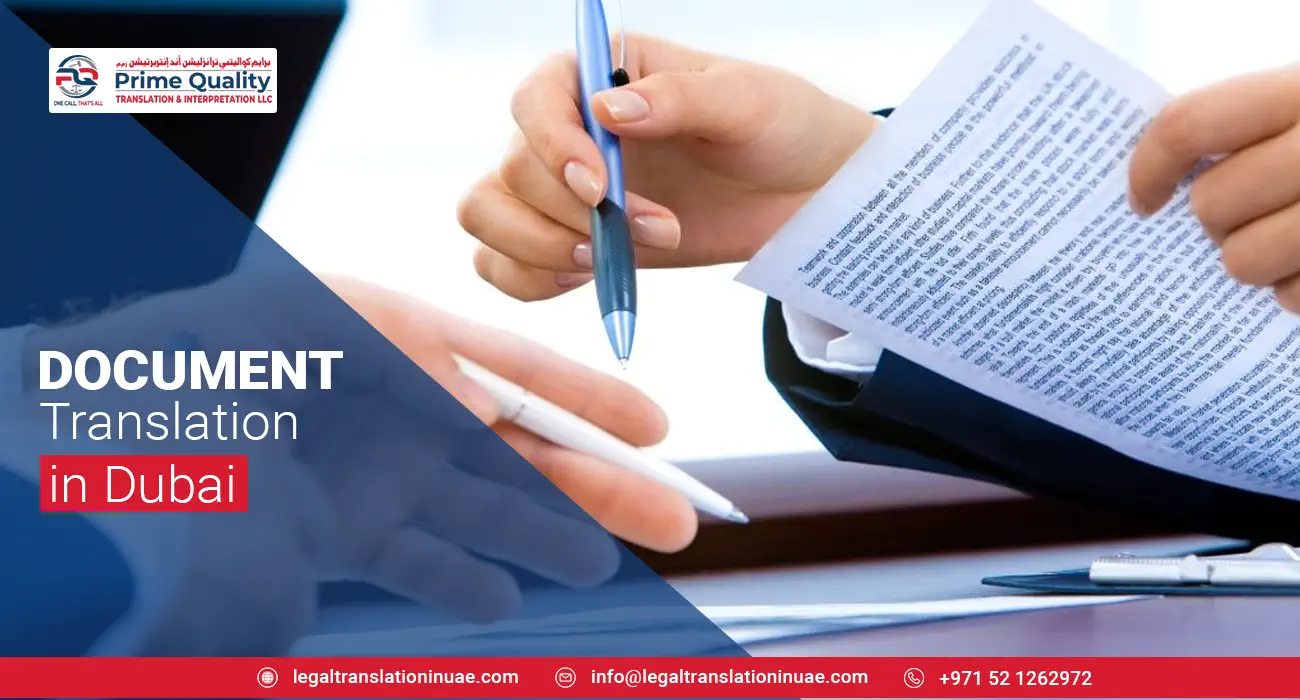
Prime Quality Translation is one of Dubai's leading accredited legal translation companies. With 20+ years of experience and a commitment to excellence, we offer precise and timely translations for various legal documents. From contracts and legal briefs to immigration and court documents, our team of certified translators ensures that every document we handle is accurately translated, reflecting the intent and legal specifics of the original text.
We understand the critical nature of legal documents and prioritize accuracy and confidentiality. Our translators are not only language experts but also familiar with the legal systems and terminology used in Dubai and internationally.
This combination of linguistic expertise and legal knowledge sets us apart as a reliable partner for all your translation needs.
Meeting International Standards with Accurate Legal Translation
We adhere to international standards, such as ISO 17100, for translation services, ensuring that our processes are consistent, systematic, and free from errors. By meeting these globally recognized benchmarks, we guarantee that our services align with the highest industry expectations.
ISO certification ensures that translations are performed by qualified linguists, reviewed by subject matter experts, and delivered within the agreed timeframe. This level of accuracy is particularly crucial for legal documents, where precision is essential.
The Risks of Non-Accredited Translation for Legal Documents
Choosing a non-accredited translation service can put you at significant risk. Some of the potential consequences include:
- Legal Complications: Inaccurate translations can lead to misunderstandings in contracts or court proceedings, which may result in legal penalties or the invalidation of documents.
- Rejection by Authorities: Non-accredited translations may not be accepted by UAE authorities, including the Ministry of Foreign Affairs or courts. This might cause major delays and additional costs.
- Increased Costs: Errors in legal translations can lead to costly mistakes, whether through fines, disputes, or the need for retranslation.
- Lack of Confidentiality: Non-accredited providers may not prioritize data security, which can result in confidential or sensitive information breaches.
How Our Translators Ensure Compliance with UAE Laws?

At Prime Quality Translation, compliance with UAE laws is a top priority. Our translators are fluent in multiple languages and experts in legal terminologies, ensuring that the legal nuances of each document are accurately preserved in translation.
We follow a stringent quality control process that involves multiple steps:
1. Certified Legal Translators
All of our translators are certified and have expertise in legal terminology and the languages they translate.
2. Thorough Reviews
Each document undergoes a meticulous review process by legal professionals to ensure its accuracy and compliance with local laws.
3. Regular Training
Our translators continuously undergo training to stay current with updates to legal practices and terminology.
4. Client-Centric Approach
We tailor our translation solutions to meet each client's requirements, ensuring that your documents are legally sound and practical.
Key Benefits of Choosing a Certified Legal Translation Company in Dubai
When you opt for a certified legal translation company in Dubai, you enjoy several benefits, including:
- Reliability: Accredited company is recognized by local and international authorities for their trustworthy and consistent translation services.
- Enhanced Accuracy: With experienced professionals at the helm, an accredited company guarantees that all legal terms are correctly translated, avoiding costly errors.
- Efficiency: An accredited company will manage tight deadlines, ensuring that legal documents are translated in time for urgent proceedings.
- Confidentiality: Accredited company adheres to strict confidentiality agreements, ensuring that sensitive client information is always secure.
As a certified translation company, Prime Quality Translation embodies these core principles, providing top-tier services with unmatched expertise.
Key Legal Translation Services in Dubai We Offer
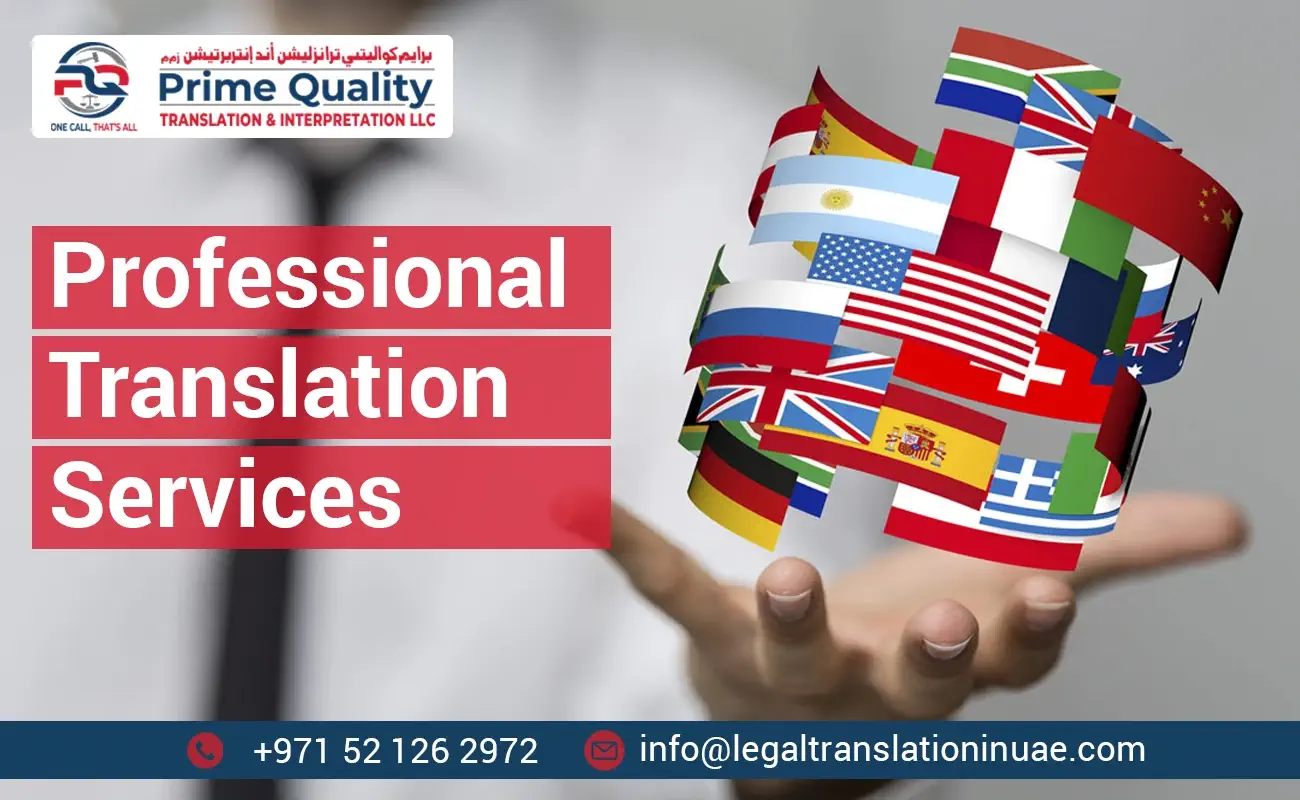
We provide a comprehensive range of legal translation services tailored to meet the diverse needs of our clients.
Some of our key offerings include:
1. Business Contracts
We accurately translate business contracts, ensuring that all legal terms are correctly conveyed.
2. Court Documents
We handle translations of court-related documents, such as summons, pleadings, and judgments, ensuring they meet the strict requirements of the UAE judiciary.
3. Immigration Documents
Our team specializes in translating visa applications, residence permits, and other immigration-related documents.
4. Legal Agreements
We provide precise translations to protect your interests, whether a non-disclosure agreement or a memorandum of understanding.
5. Certified Notarized Translations
We provide notarized translations recognized by UAE authorities for documents requiring official certification.
Conclusion
Choosing an accredited legal translation company in Dubai, such as Prime Quality Translation, ensures that your documents are translated with the highest accuracy and compliance. With a deep understanding of legal systems and an unwavering commitment to quality, we guarantee that your documents will be recognized by courts, businesses, and government bodies both locally and internationally.
Don't risk errors in your legal documents; choose accredited professionals to protect your legal rights and interests.
Call to Action (CTA)
Are you seeking precise, accredited, and reliable legal translation services in Dubai? Contact us today to ensure that your legal documents meet the highest standards of accuracy and compliance. Get a free quote now to discuss your translation needs, and let us help you navigate the complexities of translation.

Legal translation is essential to any legal or business transaction involving foreign languages. In Dubai, where the population is multicultural and diverse, the need for certified Legal Translation Services in Dubai is increasingly significant.
This article explores the importance of translation services, their benefits, and how Prime Quality Translation ensures accuracy and confidentiality in legal documents. Whether you're an individual or a business, knowing what to look for in a translation provider is crucial.
Understanding Legal Translation
Legal translation is translating documents with legal significance, such as contracts, wills, birth certificates, and court documents, from one language to another. It is distinct from general translation because it requires a deep understanding of legal terminology and knowledge of the laws and practices in both the source and target countries.
In Dubai, where legal processes often involve different languages, a certified and reliable legal translation service ensures that all parties understand the document's legal implications. Without this, there could be significant risks of misinterpretation, which can lead to legal consequences.
Why Certified Legal Translation Service Matter?
A certified legal translation service is essential for businesses, legal professionals, and individuals. This service ensures that translations are accurate, legally accepted, and recognized by authorities.
Here are some reasons why it matters:
- Legal Validity: Certified translations are accepted by courts, immigration departments, and government institutions. A translation might not be considered official or valid in legal matters without certification.
- Accuracy: Legal documents contain intricate details and specific terminology that must be translated precisely. Certified translators are highly trained in legal terminology, ensuring that the original document's meaning is maintained without distortion.
- Avoiding Legal Risks: Incorrect translations in legal matters can lead to misunderstandings or disputes, potentially resulting in costly legal consequences. Certified translators take extra care to minimize these risks.
- Peace of Mind: When working with certified legal translators, clients can trust that the translations are accurate and meet the highest standards required by law.
Prime Quality Translation for Certified Legal Translation Services in Dubai
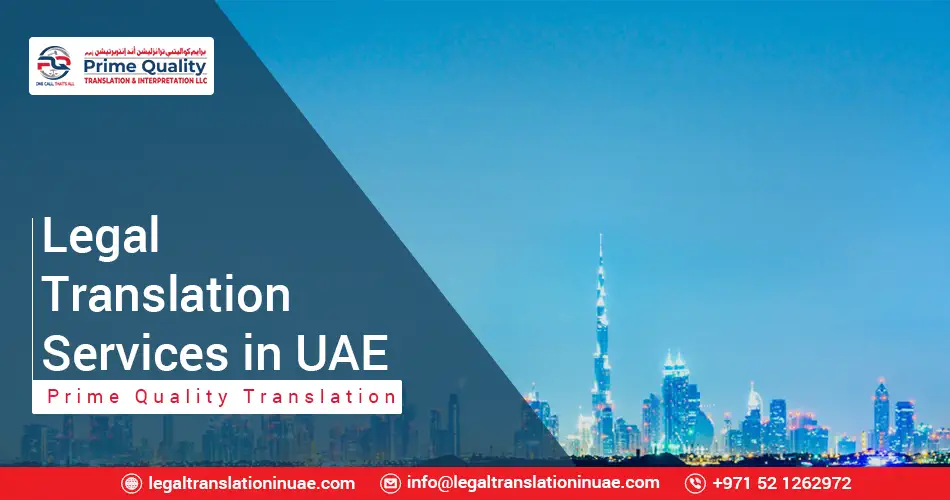
Prime Quality Translation is a trusted name for certified legal translation services in Dubai, we specialize in providing precise, legally compliant translations across various industries. Whether you are dealing with business contracts, personal documents, or court-related materials, we offer solutions that meet all legal and regulatory requirements in Dubai.
As a leading provider of translation, we ensure that every translation is conducted by experienced, certified translators. Our translators are fluent in multiple languages and possess the legal expertise required to handle complex legal documents with care and accuracy.
Our Certified Legal Translators Ensure Accuracy and Precision
We pride ourselves on our team of certified legal translators. They have a deep understanding of legal systems and languages, allowing them to handle translations with high precision.
Here's how we ensure the accuracy and reliability of our translations:
- In-depth Legal Knowledge: Our translators have a solid grasp of the legal systems of the source and target languages. This ensures that legal terms are translated correctly and in a manner that complies with the legal frameworks of both regions.
- Attention to Detail: We understand the importance of every detail in legal documents. Our translators meticulously review each document to ensure all information is accurately conveyed.
- Verification and Quality Control: Before any document is delivered to the client, it undergoes a strict quality control process. This ensures no errors or inconsistencies, providing peace of mind to our clients.
Key Features of Prime Quality Translation
We stand out as a trusted provider of translation due to several key features that define our service offerings:
1. Fast Turnaround Times
We understand that legal matters often require quick action. We offer fast and efficient translation services without compromising on quality.
2. Comprehensive Service Range
We cover many legal document translations, including contracts, agreements, corporate documents, immigration papers, academic documents, and more.
3. Confidentiality Assurance
We recognize the sensitive nature of legal documents and take extra precautions to ensure that all client information is handled with the utmost confidentiality.
4. Affordable and Transparent Pricing
Our services are reasonably priced, with no hidden costs. You'll always know the cost upfront, and our pricing structure is designed to provide value for money.
Industries That Rely on Legal Translations in Dubai
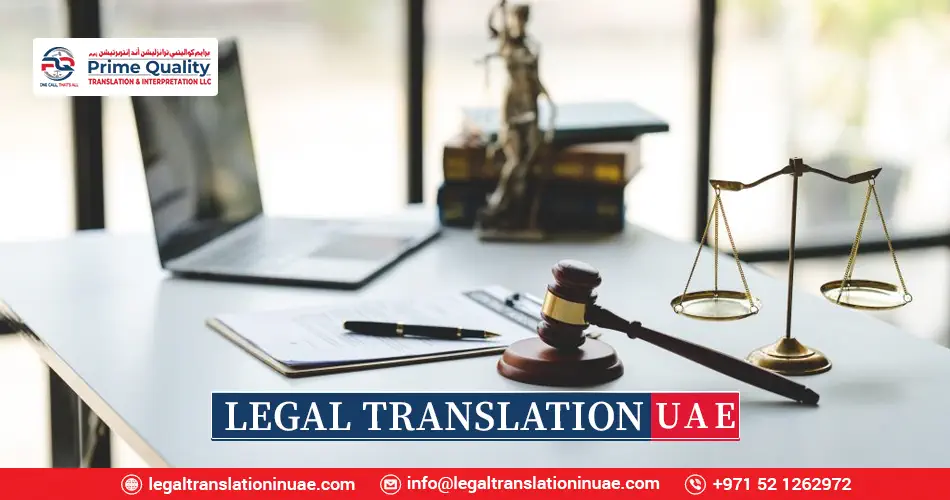
Legal translations are indispensable in several industries in Dubai, including but not limited to:
1. Corporate and Business
Companies operating in Dubai often need legal translations for contracts, agreements, shareholder documents, and corporate filings. Accurate translations ensure that all business transactions are transparent and legally binding.
2. Immigration and Residency
Individuals applying for visas, residency, or citizenship in Dubai must provide certified translations of legal documents, such as birth certificates, marriage licenses, and academic qualifications.
3. Real Estate
Real estate transactions, including property contracts, deeds, and leasing agreements, require precise legal translations to ensure compliance with Dubai's legal standards.
4. Legal and Judicial Services
Lawyers, law firms, and courts frequently need legal translations for court documents, witness statements, and legal briefs.
5. Healthcare and Medical
Medical documents, including patient records, medical reports, and insurance papers, often need certified translations for legal and regulatory purposes.
6. Education
Translations are often required for academic transcripts, diplomas, and certificates for students or professionals moving to Dubai for further studies.
Why Confidentiality is Non-Negotiable in Legal Translation?
Legal documents often contain highly sensitive information, such as personal identification details, financial data, and business strategies. Therefore, confidentiality in translation is crucial. At Prime Quality, we implement strict measures to ensure the privacy and security of all client documents, including:
- Non-Disclosure Agreements (NDAs): We ensure that all our translators sign NDAs to prevent any unauthorized access to your sensitive documents.
- Secure Data Handling: We use advanced encryption and secure systems for storing and sharing documents, guaranteeing that all translations are confidential.
- Ethical Practices: Our team adheres to the highest ethical standards when handling client documents, ensuring that all personal and confidential information remains protected.
Why Individuals and Businesses Trust Our Reliable Legal Translation Services in Dubai?

Prime Quality Translation has earned a solid reputation for providing reliable legal translation. Clients trust us because we consistently deliver high-quality translations that meet the specific needs of individuals and businesses. Here's why:
1. Expertise
Our certified translators have extensive knowledge of legal terminology and the translation process, ensuring the highest accuracy in every project.
2. Reliability
We pride ourselves on our timely delivery and responsiveness, ensuring clients can rely on us to meet deadlines and legal requirements.
3. Tailored Solutions
We understand that every legal document is unique, and we tailor our services to meet each client's specific needs.
4. Positive Feedback
Our satisfied clients continue to return to us for their translation needs, a testament to their trust and confidence in our services.
Conclusion
Legal and accurate translation services are essential for ensuring your legal documents are accurately translated and legally recognized. Whether you are a business or an individual, Prime Quality Translation is committed to providing the most reliable, accurate, and timely Legal Translation Services in Dubai.
Our team of certified translators ensures that all your documents meet the highest quality, accuracy, and confidentiality standards.
Call to Action (CTA)
Are you in need of certified legal translations? Contact us today for professional, accurate, and legally compliant translations. Let us help you navigate your legal and business needs quickly and confidently. Reach out now for a free quote and consultation!

In Dubai, a city renowned for its cultural diversity and global commerce, translation has become an essential tool for bridging communication gaps. As businesses and individuals navigate the multilingual environment, accurate and reliable translation is key to success.
Prime Quality Translation, a leading name in the industry, specializes in providing expert translation solutions tailored to meet the unique demands of this vibrant city. Whether handling legal documents or crafting marketing campaigns, our team ensures clarity and precision in every project.
The Significance of Translation in Dubai's Multicultural Landscape
Dubai is a global hub where over 200 nationalities coexist, each bringing its own language and culture. Effective communication is crucial in such a dynamic environment, and this is where translation plays a pivotal role. Prime Quality recognizes the importance of connecting people and businesses through language, offering comprehensive solutions that cater to the diverse needs of Dubai’s residents and industries.
From facilitating trade and tourism to supporting education and legal systems, translation serves as a bridge that unites Dubai's multicultural community. By enabling clear and accurate communication, we help businesses and individuals overcome language barriers, ensuring that their messages resonate across cultures.
Why Translation in Dubai is Vital for Legal Documents?

Legal documents demand absolute accuracy and adherence to local regulations. In Dubai, the stakes are high, as errors in translation can lead to legal complications and financial losses.
Prime Quality Translation specializes in legal translation, ensuring that contracts, agreements, court documents, and immigration paperwork are accurately translated and officially recognized. With expertise in 200+ languages, we guarantee precision and compliance with the UAE's legal standards.
Our team's familiarity with Dubai's legal framework ensures that translations are not only linguistically accurate but also culturally and contextually appropriate. This meticulous approach eliminates risks, builds trust, and facilitates smooth interactions with government entities and legal authorities.
Bridging Language Barriers in Marketing Campaigns
Dubai’s booming business environment attracts global companies aiming to capture the local market. However, marketing success relies on effectively communicating with a diverse audience. Our marketing experts excel in translating and localizing campaigns to resonate with Dubai's multicultural demographics. By adapting slogans, content, and visuals, we help businesses engage their audience while preserving the essence of their brand.
Successful marketing in Dubai requires a deep understanding of cultural preferences and sensitivities. Our localization services go beyond word-for-word translations, ensuring that campaigns are culturally relevant and impactful. This strategy helps brands establish a genuine connection with their target audience.
Certified Translation in Dubai: Ensuring Accuracy and Official Recognition
Certified translation is a cornerstone of our services. Whether you need documents for government approvals, visa applications, or business transactions, certified translations are often mandatory. Our team ensures that every translation meets the stringent requirements of Dubai's authorities, providing clients with peace of mind and saving them from potential delays or rejections.
With a proven track record of delivering accurate and certified translations, Prime Quality Translation become a trusted name for individuals and businesses seeking official document translation in Dubai. Our commitment to quality and reliability sets us apart in the competitive translation landscape.
Tailored Translation in Dubai for Different Industries
Every industry in Dubai has unique translation needs, and we offer customized solutions to meet these requirements.
From medical and legal sectors to tourism and finance, our expert translators possess the knowledge and skills to deliver industry-specific accuracy. By understanding the nuances of each field, we provide translations that reflect the correct terminology and tone.
For instance, translating medical reports requires precision and knowledge of medical terminology, while financial translations demand expertise in economics and banking. We ensure that each project is handled by specialists with relevant industry experience, guaranteeing exceptional results.
Overcoming Cultural Nuances in Marketing Translation
Marketing translation goes beyond language conversion; it involves cultural adaptation to ensure the message resonates with the target audience. Dubai's cultural diversity presents unique challenges, but our team excels at crafting culturally appropriate translations. We focus on maintaining brand integrity while tailoring content to align with local sensitivities and preferences.
Our approach includes understanding the cultural values, traditions, and expectations of the target audience. By addressing these factors, we help businesses avoid potential pitfalls and create campaigns that inspire trust and engagement.
The Role of Our Professional Translators
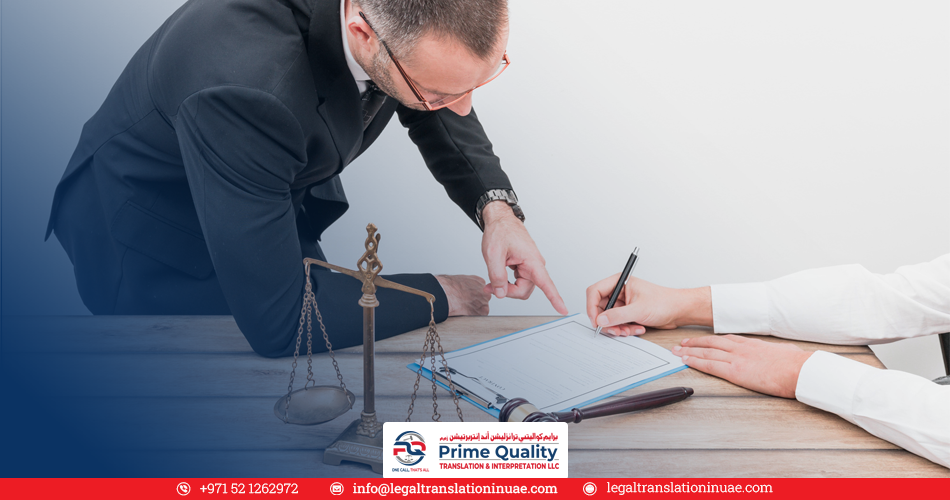
At the heart of Prime Quality is a team of skilled and experienced translators. Each professional is carefully selected for their expertise in specific languages and industries.
With a commitment to delivering excellence, our translators ensure that every project, whether a legal document or a marketing campaign, meets the highest standards of quality and precision. Their dedication to detail has earned us the trust of clients across Dubai and the UAE.
Our team's continuous training and adherence to global best practices ensure that they remain at the forefront of the translation industry. This expertise, combined with advanced tools and technologies, allows us to handle projects of any complexity with ease.
How Does Translation in Dubai Help Build Trust Across Borders?
Trust is the foundation of successful business relationships, and effective translation fosters this trust.
Prime Quality Translation helps companies build credibility by delivering accurate translation in Dubai that eliminate misunderstandings and reinforce professionalism. Our services enable seamless communication, whether you're negotiating international deals or engaging with local clients, ensuring your message is clearly understood.
By aligning with cultural and language expectations, our translations demonstrate respect and understanding, which are crucial for building strong and lasting relationships. This approach has made us a preferred partner for businesses seeking to expand their global reach.
Conclusion
Translation in Dubai is more than a service; it's a gateway to new opportunities and stronger connections in a multilingual world. Prime Quality stands out as a trusted partner, offering tailored solutions that cater to the city's dynamic needs. From legal documents to marketing campaigns, we provide accuracy, cultural sensitivity, and professionalism in every project.
Our commitment to excellence, combined with a client-centric approach, ensures that we consistently exceed expectations. With us, you can navigate Dubai's multicultural landscape with confidence and ease.
How to Get Started with Prime Quality?
Getting started with Prime Quality is simple and hassle-free. Visit our website to explore our wide range of services and submit your requirements online. Our team is always ready to assist, ensuring timely delivery and exceptional quality for every project. Partner with us to experience the difference of expert translation in Dubai.
Whether you need assistance with legal documents, marketing campaigns, or industry-specific projects, we are here to help you succeed. Contact us today and take the first step towards clear and effective communication. We also offer a 100% free quote option.
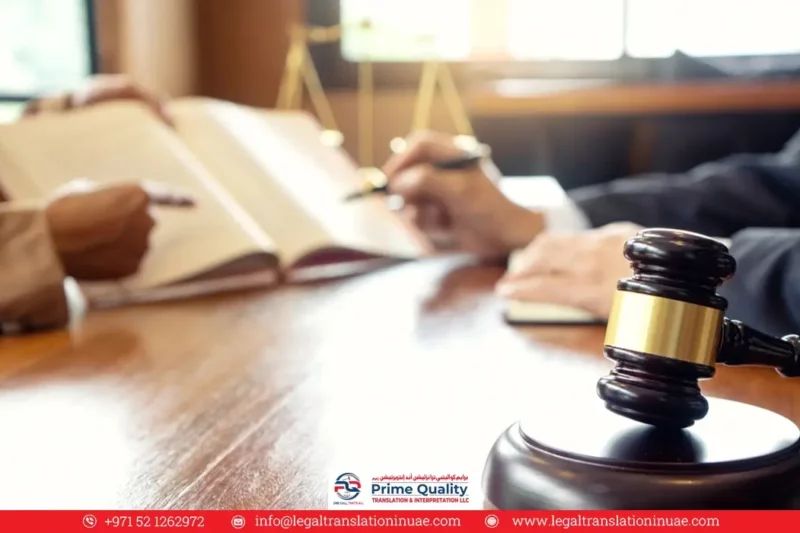
In a globalized world where businesses are expanding beyond borders, the need for precise, timely, and confidential legal translations is more critical than ever. Whether you're a legal professional, a business executive, or an individual dealing with legal matters, having access to reliable Legal Translation Dubai is essential.
Prime Quality Translation is at the forefront of providing legal translations, ensuring that legal documents are translated with the highest accuracy, confidentiality, and speed.
Understanding the Importance of Legal Translation Dubai
Legal translation plays a pivotal role in facilitating communication between parties from different language backgrounds. In a diverse and multicultural city like Dubai, where multiple languages are spoken daily, legal documents often need to be translated for various purposes.
Translation ensures that agreements, contracts, court orders, and other critical documents are accurately conveyed, preserving their original meaning and legal intent.
Why Accuracy Matters in Legal Document Translation?
Legal documents are not like general texts or casual communications; they carry significant weight and consequences. The precision of translation ensures that the original document's meaning is fully preserved in another language. Even a minor error or misinterpretation could lead to costly legal disputes or delays.
In Dubai, where both local and international legal systems intersect, translation companies must understand the nuances of the UAE's legal framework. Prime Quality Translation ensures that each translation is handled with meticulous attention to detail, aligning with the legal standards of Dubai and the UAE.
Legal and accurate translation supports the integrity of agreements, protects businesses from potential risks, and provides legal clarity in different languages. With a skilled legal translator, your documents will be precisely translated, avoiding any possibility of ambiguity or confusion that could undermine legal proceedings.
How Fast Legal Translation Supports Business Efficiency?
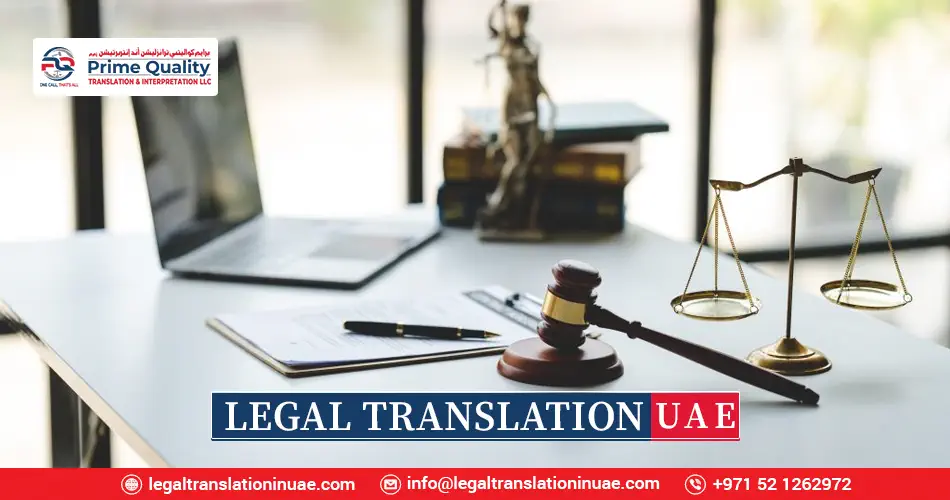
In the fast-paced environment of Dubai, businesses cannot afford delays when it comes to legal documentation. Legal translation must be swift to ensure that agreements are signed, contracts are enforced, and business transactions proceed without hindrance.
Timely legal translations reduce waiting times, allowing companies to move forward with their business plans and legal processes.
Moreover, when dealing with urgent matters, such as visa applications, employment contracts, or legal disputes, speed becomes even more critical. Prime Quality prioritizes fast legal translations, ensuring that clients receive their documents promptly without compromising on quality. With fast translation services, businesses can meet tight deadlines, avoid unnecessary delays, and keep their operations running smoothly.
Fast translation also plays a key role in international transactions, mergers, acquisitions, and negotiations. When legal documents need to be exchanged between parties from different countries, time is of the essence.
Confidentiality in Legal Translation: Protecting Sensitive Information
Legal documents often contain sensitive information, including personal details, confidential business data, or proprietary intellectual property. When translating such documents, confidentiality is of the utmost importance. A breach of confidentiality in translation can have severe consequences, such as:
- Reputational Damage
- Financial Loss
- Legal Ramifications
At Prime Quality Translation, we adhere to strict confidentiality protocols to ensure that every document remains protected throughout the translation process. Our team of certified legal translators understands the sensitivity of legal documents and the importance of maintaining privacy.
To further safeguard your documents, we employ secure transmission methods, ensuring that your files are only shared with authorized personnel. Clients can trust that their confidential information will be handled securely, with the utmost care and discretion.
Legal Translation Dubai: The Role of Prime Quality Translation
As a leading provider of Legal Translation Dubai, Prime Quality Translation plays a crucial role in ensuring that businesses, legal professionals, and individuals have access to reliable and accurate translations. Our expertise spans various industries, including law, healthcare, finance, and corporate sectors, offering customized translation solutions to meet the diverse needs of our clients.
We specialize in translating a wide range of legal documents, including contracts, agreements, wills, patents, court transcripts, and immigration documents. By maintaining high standards of accuracy, speed, and confidentiality, we enable our clients to navigate legal processes with confidence and ease.
Our Certified Legal Translators: Ensuring Compliance with UAE Laws
Legal translations are not only about linguistic accuracy but also about ensuring compliance with the UAE's legal regulations. We employ certified legal translators who are well-versed in both the legal terminologies of various languages and the laws of Dubai and the UAE.
Our translators undergo rigorous training to ensure they are familiar with legal documents' specific terminology, making them capable of providing precise and legally compliant translations.
Our certified legal translators are aware of the legal requirements for document recognition in the UAE. For instance, many documents translated in Dubai must be notarized or certified to be considered valid in legal proceedings. We ensure that all legal translations meet the necessary legal standards for both local and international use.
Essential Qualities of a Trusted Legal Translation Company in Dubai

Choosing the right translation company is crucial for ensuring that your legal documents are accurately translated and meet the required standards.
1. Certified Translators
Ensure that the company employs certified translators with legal expertise in the required language pairs.
2. Accuracy
Look for a company known for its commitment to delivering precise and reliable translations.
3. Confidentiality
Choose a company with a strong reputation for safeguarding sensitive information.
4. Experience
Select a company with years of experience in the translation industry, as they will be more adept at handling complex documents.
5. Timely Delivery
A reliable company should prioritize delivering translations quickly, especially in urgent cases.
Prime Quality embodies all these qualities, offering top-tier legal and accurate translation services to clients in Dubai and beyond.
Legal Translation Dubai: Key Industries Relying on Professional Translation Services
Legal translation is crucial for various industries in Dubai, including:
1. Legal Sector
Law firms and legal professionals need accurate translations of court documents, contracts, and official agreements.
2. Real Estate
The real estate sector requires the translation of property contracts, leases, and agreements between international buyers and sellers.
3. Business and Finance
Companies often need translations of financial reports, shareholder agreements, and business contracts.
4. Immigration
Translation of visa documents, work permits, and immigration paperwork is essential for individuals relocating to Dubai.
Each of these industries relies on professional legal translations to ensure that their documents are legally sound and compliant with regulations.
Conclusion
Legal Translation Dubai is a vital service for businesses, legal professionals, and individuals who need to navigate the legal landscape accurately, efficiently, and confidentially. With fast, accurate, and secure translation solutions, Prime Quality Translation ensures that clients can trust their legal documents are in capable hands.
Whether you need translation for business contracts, court documents, or immigration papers, our certified translators are ready to provide reliable and compliant translations that meet the highest standards.
Call to Action (CTA)

If you need fast, accurate, and confidential legal translations, don't hesitate to get in touch with Prime Quality today. Our team of certified translators is ready to assist with your legal translation needs. Contact us now for a consultation or to get a free quote. Your legal documents deserve the best—trust us to deliver!
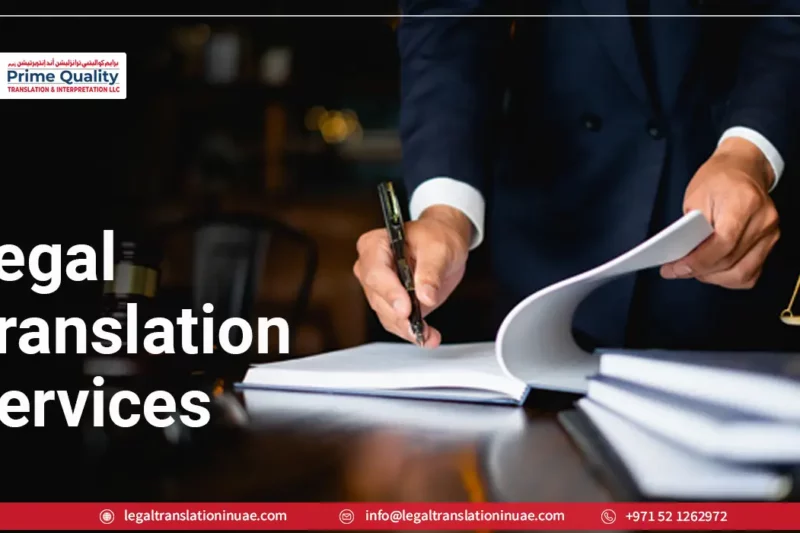
In Dubai's fast-paced business environment, legal translation plays a crucial role in ensuring seamless communication across diverse industries. Whether it's contracts, agreements, or official documents, the accuracy and reliability of legal translations are essential.
For businesses and individuals alike, accessing certified and affordable legal translation services in Dubai is key to maintaining legal compliance and achieving success in global markets.
Why Affordable and Certified Legal Translation Matters?
Legal documents contain sensitive information that demands precise translation. Any inaccuracies can lead to misunderstandings, legal disputes, or compliance issues.
- Certified legal translation ensures that documents are translated by qualified professionals who understand legal terminology and local regulations.
- Affordability is equally important, allowing startups, SMEs, and corporations to access high-quality services without stretching their budgets.
Combining affordability with certification guarantees reliability, accuracy, and trust in every translated document.
Prime Quality Translation Provides Affordable and Certified Legal Translation Services in Dubai for Every Industry

Prime Quality Translation stands out in Dubai's competitive market by offering top-notch legal and accurate translation services tailored to various industries. Our certified legal translators specialize in translating legal documents for sectors such as real estate, healthcare, finance, technology, and more.
By focusing on industry-specific terminology and legal frameworks, we ensure that every document is accurate and compliant. Our affordable pricing model makes it easier for businesses of all sizes to access premium legal and accurate translation without compromising on quality.
How Our Best Translators Ensure Accuracy and Compliance?
We employ a team of experienced and certified translators with expertise in multiple legal systems and industries. Our translators undergo rigorous quality checks to ensure every document meets legal standards and industry-specific requirements.
We utilize advanced translation tools alongside human expertise to maintain consistency, accuracy, and compliance. Each project is handled with strict confidentiality, ensuring sensitive legal information is protected at every stage.
Why Dubai’s Leading Businesses Trust Prime Quality Translation?
Dubai’s leading corporations, law firms, and government institutions trust us because of our commitment to excellence.
1. Certified Expertise
Our team of professional translators is certified and well-versed in UAE legal standards, ensuring document accuracy and compliance.
2. Industry-Specific Solutions
We provide tailored translation services for industries such as legal, finance, healthcare, real estate, and technology.
3. Confidentiality Assurance
We prioritize the security and confidentiality of sensitive legal documents.
4. Timely Delivery
Our efficient processes ensure that translations are completed on time without compromising quality.
5. Affordable Pricing
We offer competitive pricing with no hidden fees, making quality translation accessible to businesses of all sizes.
6. Trusted by Top Firms
Leading law firms, corporations, and government institutions in Dubai rely on our reliable and certified translations.
Meeting UAE Legal Standards with Certified Translations
Legal translations in Dubai must adhere to strict UAE regulatory requirements. We ensure full compliance with UAE legal standards, providing certified translations recognized by government entities, courts, and legal authorities.
Our translations cover a wide range of documents, including contracts, business licenses, immigration papers, patents, and legal agreements. By meeting these standards, we help clients avoid legal complications and facilitate smooth business operations.
Affordable Legal and Accurate Translation Services That Meets UAE Regulatory Standards
Balancing affordability with legal compliance is essential for businesses operating in Dubai. Prime Quality Translation offers cost-effective legal translation services in Dubai without sacrificing quality. We provide transparent pricing with no hidden charges, allowing clients to plan their translation needs efficiently.
Our scalable solutions cater to startups, SMEs, and large enterprises, ensuring everyone has access to certified translations that align with UAE laws and industry regulations.
Conclusion

Certified and accurate legal translation is vital for businesses and individuals navigating Dubai’s legal landscape. Prime Quality delivers affordable, precise, and industry-specific legal and accurate translation services that meet UAE regulatory standards.
By combining expertise, confidentiality, and cost-effective solutions, we help clients achieve their legal and business goals with confidence.
How to Get Started with Prime Quality?
Getting started with Prime Quality is simple. Contact us through our website or call our customer service team to discuss your legal translation needs. Share your documents securely, and our certified team will deliver accurate and compliant translations within your required timeframe.
Partner with us today and experience seamless, affordable, and certified translation services in the UAE.
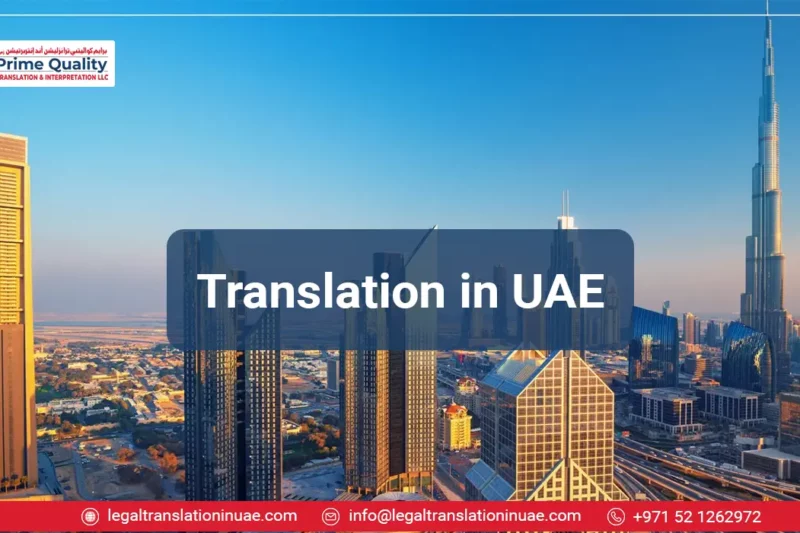
Dubai, a global hub for business, tourism, and trade, requires seamless communication across various languages. Whether you are navigating legal documents, business contracts, or personal needs, accurate translation is essential.
Prime Quality stands out as a trusted partner in providing precise, certified, and professional translation in Dubai. With 20+ years of experience in the translation industry, we ensure that all your translation needs are met with unmatched expertise and reliability.
Understanding the Importance of Accurate Translation in Dubai
In a multilingual city like Dubai, accurate translation is more than just converting words from one language to another; it's about conveying meaning, intent, and nuances accurately. Whether you're dealing with legal, medical, technical, or personal documents, ensuring accuracy in translation is crucial. Misinterpretation or translation issues may occur in:
- Confusion
- Legal Disputes
- Financial Losses
The importance of accurate translation in Dubai is especially evident in sectors like law, business, and healthcare. Prime Quality Translation understands the significance of getting it right the first time. This is why we focus on delivering accurate translations that cater to every client's unique requirements.
Prime Quality is Your Trusted Partner for Accurate Translation in Dubai

Prime Quality is recognized as one of the most reliable translation service providers in Dubai. We are proud of our reputation for delivering high-quality translations that meet the highest standards. Our commitment to accuracy, timely delivery, and customer satisfaction sets us apart as a trusted partner in the translation industry.
We understand the dynamic and diverse needs of the Dubai market, which is why our services are customized to suit every client's unique situation. Whether you are a multinational corporation, a small business, or an individual in need of personal translation services, we cater to all with the same level of precision and care.
How Our Translation Experts Ensure Precision and Clarity?
We believe in providing nothing short of excellence. Our team of experienced and certified translators is dedicated to ensuring precision and clarity in every project. Here's how we ensure top-quality translations:
- Native Linguists: We only employ native speakers of the target language, ensuring that the translation is culturally accurate and that the nuances of the language are fully understood.
- Quality Control Process: Every translation goes through a rigorous review process, where it is proofread and edited for accuracy. Our multi-step quality control ensures that no detail is overlooked.
- Cutting-Edge Technology: We use the latest translation tools and software to enhance accuracy and consistency across large projects, ensuring high-quality translations every time.
With these measures in place, we guarantee that your translations will be clear, precise, and error-free, regardless of the complexity of the document.
Certified Translation in Dubai: Guaranteeing Official Recognition and Legal Compliance
Certified translation in Dubai plays a vital role in ensuring that documents are legally recognized and accepted by government authorities, businesses, and institutions. Certified translation is required for legal documents, contracts, birth certificates, educational qualifications, and other official paperwork.
At Prime Quality Translation, we provide certified translation services that comply with the UAE's legal requirements. Our certifications ensure that your documents are translated accurately and are recognized by government bodies, courts, and other organizations.
We adhere to the highest standards of translation, ensuring that every translation is both precise and legally valid.
Why Choose Prime Quality Translation?
When selecting a translation company in Dubai, reliability, accuracy, and customer service should be at the forefront of your decision. Here's why Prime Quality Translation stands out:
1. Decades of Experience
With over 20 years in the translation industry, we have built a strong reputation for delivering high-quality translations to clients across various sectors.
2. Certified and Qualified Translators
We employ only certified translators who have the expertise and experience to handle even the most complex translation tasks.
3. Multilingual Services
We provide translation services in over 200 languages, ensuring that you can communicate effectively with anyone, anywhere.
4. Customer-Centric Approach
We prioritize customer satisfaction by offering personalized solutions, timely delivery, and affordable rates without compromising on quality.
5. Confidentiality
We understand the importance of confidentiality in handling sensitive documents. We take strict measures to protect your data and ensure privacy throughout the translation process.
Different Translation Services Provided By Us
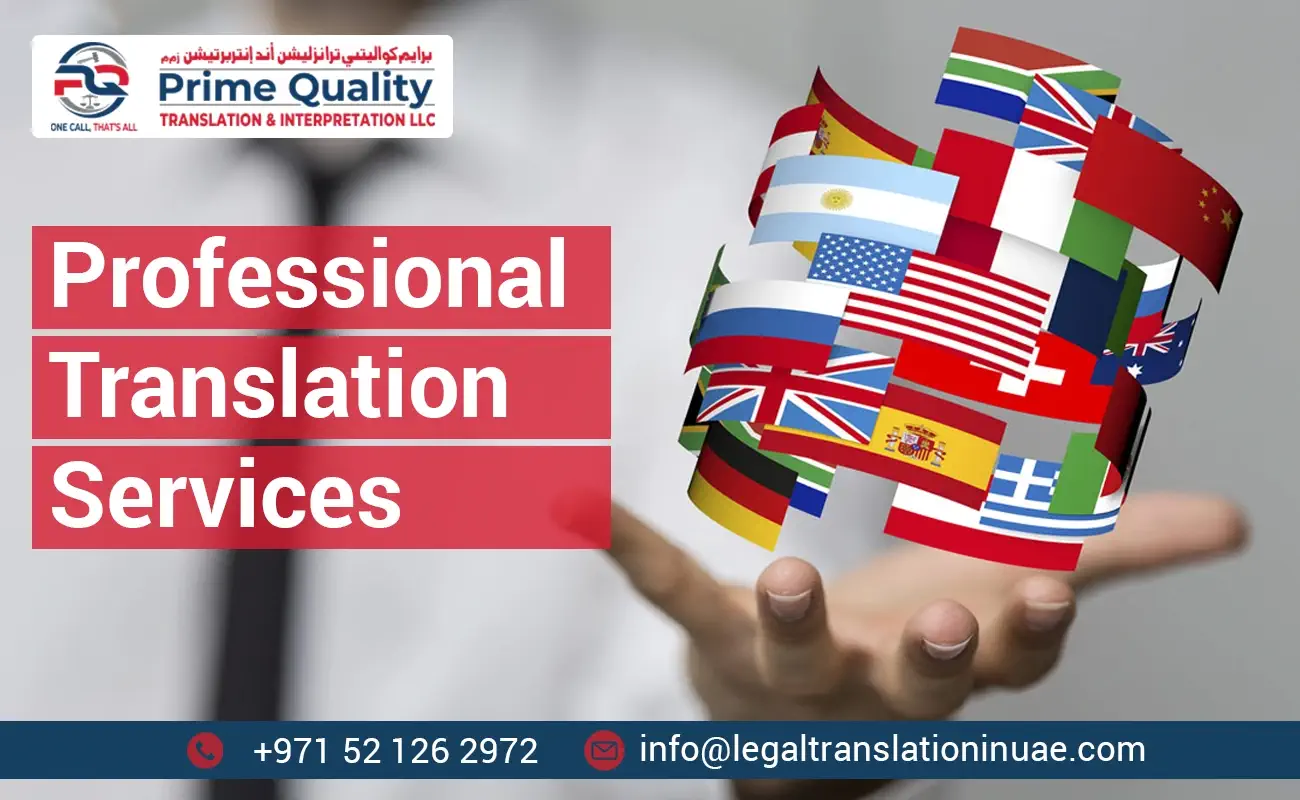
We offer a wide range of translation services designed to meet the different needs of our clients. Some of our key services include:
- Legal Translation: Contracts, agreements, court documents, and more are all handled by certified legal translators.
- Business Translation: Marketing materials, business plans, corporate communications, and website content.
- Medical Translation: Medical records, prescriptions, and healthcare documents are translated with accuracy.
- Technical Translation: Manuals, guides, and engineering documents are translated by industry experts.
- Certified Translation: For official documents requiring legal recognition, such as certificates, diplomas, and passports.
- Website and App Localization: Adapting your content for a global audience to reach diverse markets.
Whether you need services such as interpretation, transcription, or driving license translation, we provide specialized solutions tailored to your needs.
Translation for Expats: Breaking Language Barriers in Dubai
Dubai is home to a diverse expatriate community, and language barriers can be a significant challenge when navigating daily life. Whether you're applying for a visa, signing a rental contract, or handling personal documents, accurate translation is essential for expats living in Dubai.
Prime Quality Translation assists expats by providing clear and precise translations of legal, personal, and professional documents. Our services help expats break through language barriers and ensure that all documents are legally compliant and understood by all parties involved.
Enhancing Communication Across Industries: From Legal to Marketing Translation
Dubai is a thriving city with numerous industries, including finance, real estate, tourism, and healthcare. Each of these industries has specific translation needs, and we are equipped to handle them all.
- Legal Translation: Our team specializes in translating legal documents such as contracts, agreements, and court filings.
- Marketing Translation: We adapt marketing materials to resonate with local and international audiences, maintaining cultural relevance.
- Medical Translation: Our translators are well-versed in medical terminology, ensuring that healthcare documents are accurately translated.
- Technical Translation: We handle complex technical documents with attention to detail, ensuring industry-specific accuracy.
No matter your industry, we ensure effective communication and proper translation to keep your business and personal needs moving forward smoothly.
Conclusion
Prime Quality Translation is committed to providing accurate, reliable, and professional translation services in Dubai. Whether you're a business, individual, or organization, we offer tailored solutions to meet all your translation needs. Our certified translators ensure that your documents are accurately translated, legally recognized, and culturally relevant.
How to Get Started with Prime Quality?

Getting started with Prime Quality is simple. Visit our website, contact our team, and provide the details of your translation needs. We offer a free quote and ensure that your project is handled promptly and professionally. With us, you can be confident that your translations are in trusted hands.
For additional information or to obtain a quote, call us today!

